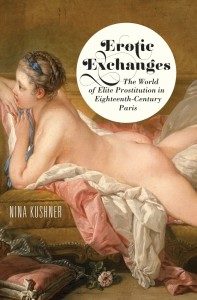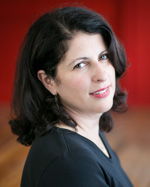 In her new book, “Erotic Exchanges: The World of Elite Prostitution in Eighteenth-Century Paris,” Clark University associate professor of history Nina Kushner explores the world of the eighteenth-century Parisian demimonde, in which women sold sex, company, and even love to the men of the elite in exchange for being “kept.”
In her new book, “Erotic Exchanges: The World of Elite Prostitution in Eighteenth-Century Paris,” Clark University associate professor of history Nina Kushner explores the world of the eighteenth-century Parisian demimonde, in which women sold sex, company, and even love to the men of the elite in exchange for being “kept.”
In “Erotic Exchanges” (Cornell University Press), Kushner reveals the complex workings of elite prostitution and professional mistresses in mid-eighteenth-century Paris. Most women became elite prostitutes out of financial desperation, or because they had been sold into it by family members. However, a small, but significant, percentage of these kept women came from a theater subculture that actively supported elite prostitution. Taking a provocative new perspective, Kushner analyzes prostitution as a profession and as a form of work, tracking the use of money, gifts, and even love in making and breaking the bonds between men and women.

“I stumbled on the files on kept women when I was going through the secret police archive in Paris,” Kushner said. “After a day or two of reading them, I was hooked. It was clear that the archive was incredibly rich, and would yield a great deal of information about these women, the men who bought their services, and the police who watched it all. I had no idea just how rich the archive was until I actually wrote the book.”
The New Yorker included Kushner’s book in its “Briefly Noted” column (March 3).
“Nina Kushner rekindles discussion of a historical population for which we have a great deal of documentation. Because of police surveillance, the dames entretenues of 18th-century France can be followed in all phases of their work lives. The result is a textured and nuanced picture of possibilities and limitations for these women in their historical setting,” writes Katherine Crawford, author of “The Sexual Culture of the French Renaissance.”
Professor Kushner specializes in early modern and eighteenth-century European social and cultural history, with an emphasis on France, women, and sexuality. She teaches courses on the history of early modern Europe, the national histories of France and England, the history of women, and the history of sexuality. Professor Kushner received a B.A. in history and religion from Dartmouth College, and an M.A. and Ph.D. from Columbia University.
Founded in 1887 in Worcester, Massachusetts, Clark University is a small, liberal arts-based research university addressing social and human imperatives on a global scale. Nationally renowned as a college that changes lives, Clark is emerging as a transformative force in higher education today. LEEP (Liberal Education and Effective Practice) is Clark’s pioneering model of education that combines a robust liberal arts curriculum with life-changing world and workplace experiences. Clark’s faculty and students work across boundaries to develop solutions to complex challenges in the natural sciences, psychology, geography, management, urban education, Holocaust and genocide studies, environmental studies, and international development and social change. The Clark educational experience embodies the University’s motto: Challenge convention. Change our world. www.clarku.edu


